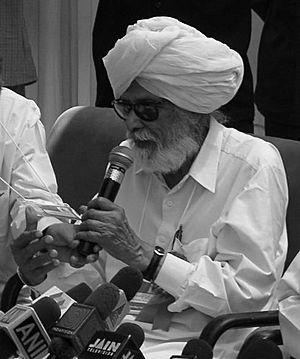Harkishan Singh Surjeet facts for kids
Quick facts for kids
Harkishan Singh Surjeet
|
|
|---|---|
 |
|
| General Secretary of the Communist Party of India (Marxist) | |
| In office 10 January 1992 – 11 April 2005 |
|
| Preceded by | E. M. S. Namboodiripad |
| Succeeded by | Prakash Karat |
| Member of the Polit Bureau of the Communist Party of India (Marxist) | |
| In office 7 November 1964 – 3 April 2008 |
|
| General Secretary of All India Kisan Sabha | |
| In office few years |
|
| Affiliations | Communist Party of India (Marxist) |
| Preceded by | Hare Krishna Konar |
| Personal details | |
| Born | 23 March 1916 Bundala, Punjab, British India |
| Died | 1 August 2008 (aged 92) Noida, Uttar Pradesh, India |
| Political party | Communist Party of India (Marxist) |
| Known for | Co-founder of Communist Party of India (Marxist) |
Harkishan Singh Surjeet (born March 23, 1916 – died August 1, 2008) was an important Indian politician from Punjab. He was a leader in the Communist Party of India (Marxist). He served as the General Secretary of the party from 1992 to 2005. He was also a member of the party's top decision-making group, the Political Bureau, for many years.
Early Life and Political Beginnings
Harkishan Singh Surjeet was born in 1916 in a Jat Sikh family. His village was Bundala, in the Jalandhar district of Punjab. He started his political journey when he was a teenager. He was inspired by the revolutionary Bhagat Singh. In 1930, he joined Bhagat Singh's group, the Naujawan Bharat Sabha.
In 1936, Surjeet joined the Communist Party of India. He also helped start the Kisan Sabha, which was a union for farmers in Punjab. Before World War II, he began publishing newspapers called Dukhi Duniya and Chingari. During the war, the British rulers put him in prison. When India became independent in 1947, Surjeet was the leader of the Communist Party in Punjab. Even though he wore a Sikh turban, he did not believe in God and was an atheist.
Joining the Communist Party
Harkishan Singh Surjeet spent more than 70 years in politics. He strongly fought against British rule in India. He played a key role in building the farmers' movement and the Communist Party in Punjab. Later, he became a national leader for both the Communist Party of India and the All India Kisan Sabha. For four decades, he was a leading figure in the CPI(M).
Surjeet's journey as a revolutionary began after he was inspired by Bhagat Singh. In March 1932, when he was only 16, he raised the Indian flag at the district court in Hoshiarpur. He was arrested for this and sent to a special school for young offenders. After he was released, he met early Communist leaders in Punjab.
He officially joined the Communist Party in 1934. In 1938, he became the secretary of the Punjab State Kisan Sabha. That same year, he was told to leave Punjab. He went to Saharanpur in Uttar Pradesh and started a monthly newspaper called 'Chingari'. When World War II began, he went into hiding. He was arrested in 1940 and held in the famous Lahore Red Fort. He was kept alone in harsh conditions for three months. Later, he was moved to a detention camp until 1944. During the time of India's partition, he worked hard to bring peace between different groups in Punjab, which was facing a lot of violence.
After India gained independence, Surjeet had to go into hiding for four years. Other Communist leaders were also arrested. In the 1950s, he led a big movement in Punjab against a special tax on farmers. His work with farmers led him to become the General Secretary and then the President of the All India Kisan Sabha. He also worked with unions for farm workers.
In 1964, the Communist Party of India split into two. Surjeet joined the new party, the Communist Party of India (Marxist). He was one of the first nine members of the CPI(M)'s Polit Bureau.
Leading the Party
Surjeet continued to rise in the party. In 1992, he was chosen as the General Secretary of the Central Committee of the CPI(M). He held this important position until 2005, retiring at the age of 89.
Surjeet was known for strongly opposing the BJP party and any kind of religious division. He helped create many groups that worked against the BJP in the 1990s. He also made sure that left-wing parties supported the UPA government. Even after he retired as General Secretary, Surjeet remained active in Indian politics. He was often seen as a clever "king-maker" in parliament. He helped bring different groups together to form governments, especially after the 2004 Lok Sabha election and during the 1996-1998 United Front government.
In April 2008, because his health was getting worse, Surjeet was not included in the CPI(M) Politburo for the first time. Instead, he was made a Special Invitee to the Central Committee. Harkishan Singh Surjeet passed away in New Delhi on August 1, 2008, from a heart attack. He was 92 years old and had been recovering in a hospital in Noida since July 25, 2008.
See also
 In Spanish: Harkishan Singh Surjeet para niños
In Spanish: Harkishan Singh Surjeet para niños
 | Precious Adams |
 | Lauren Anderson |
 | Janet Collins |

